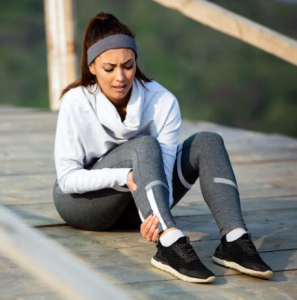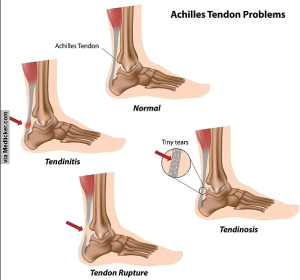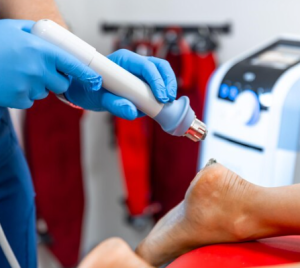Achilles tendinopathy is a common condition that affects the Achilles tendon, which connects the calf muscles to the heel bone. This tendon plays a crucial role in walking, running, and jumping, making it essential for various physical activities, especially high intensity ones. Achilles tendinopathy can be significantly painful and uncomfortable and disrupt not only your athletic performance but daily life as well. In this blog, we’ll explore the causes, symptoms, and treatment options for Achilles tendinopathy.
What Causes Achilles Tendinopathy?
Achilles tendinopathy occurs when the Achilles tendon is subjected to repetitive stress and overuse. For example, Several factors can contribute to this condition including:
- Repetitive movements and overuse – Firstly, engaging in activities that involve repetitive motion, such as running, jumping, or intense physical training, can lead to micro-tears in the tendon.
- Sudden increase in activity level – Rapidly increasing the intensity or duration of physical activity without adequate preparation can strain the Achilles tendon. Alternatively, starting a new training regimen without proper load management can also contribute to the issue.
- Improper footwear – Wearing shoes that lack proper support or cushioning can increase the strain placed on the tendon
- Biomechanical issues – Abnormal foot mechanics, such as flat feet or high arches, can place additional stress on the Achilles tendon.
- Age and degeneration – Naturally, as people age, the Achilles tendon can become less flexible and more prone to injury due to natural age-related changes
Signs and Symptoms
The symptoms of Achilles tendinopathy can vary depending on the severity of the condition. However, the most common signs and symptoms include:
- Pain and Stiffness – Pain is typically felt along the back of the leg near the heel. Most often, it is more pronounced in the morning or after periods of inactivity.
- Swelling and tenderness – The affected area may become swollen and tender to the touch.
- Restricted mobility – Flexing the foot or standing on your tiptoes may be difficult due to pain and stiffness in the area
Diagnosis
A healthcare professional like a physiotherapist will typically diagnose Achilles tendinopathy based on a physical examination and your subjective report of your experiences. Imaging tests, such as ultrasound or MRI, may be used to assess the extent of the tendon damage if deemed necessary.
Treatment
Treatment for Achilles tendinopathy focuses on reducing pain, promoting healing, and preventing further injury. Here are some effective treatment options:
- Rest and activity modification: Reducing or avoiding activities that make the pain worse is crucial. Switching to low-impact exercises, such as swimming or cycling, can help maintain fitness without putting excessive stress on the tendon while it heals.
- Ice and compression: Applying ice packs to the affected area and using compression bandages can help reduce swelling and pain in the acute stages.
- Stretching and strengthening: Physical therapy exercises that focus on stretching the calf muscles and strengthening the Achilles tendon can aid in recovery. Eccentric exercises, where the tendon is lengthened under load, are particularly beneficial.
- Orthotics and Proper footwear: Wearing supportive shoes and using orthotic inserts can help alleviate pressure on the Achilles tendon.
- Shockwave Therapy: This non-invasive treatment uses shockwaves to stimulate healing in the tendon. Clinical research supports the greater benefits with shockwave combined with physical therapy.
- Surgery: In severe or chronic cases that do not respond to conservative treatments, surgical intervention may be necessary to repair the damaged tendon. This is usually a last resort, and many patients recover through conservative treatments under the guidance of a physical therapist.
Need help with Achilles tendinopathy?
If you suspect you may have Achilles tendinopathy or are experiencing any kind of ankle or pain, look for PhysioNow. We have many experienced Physical Therapists who would love to help you out. With 9 locations across the GTA including Burlington, Oakville, Mississauga and Etobicoke, you can get help fast. Book with PhysioNow today for you first assessment and treatment!






Leave a Reply